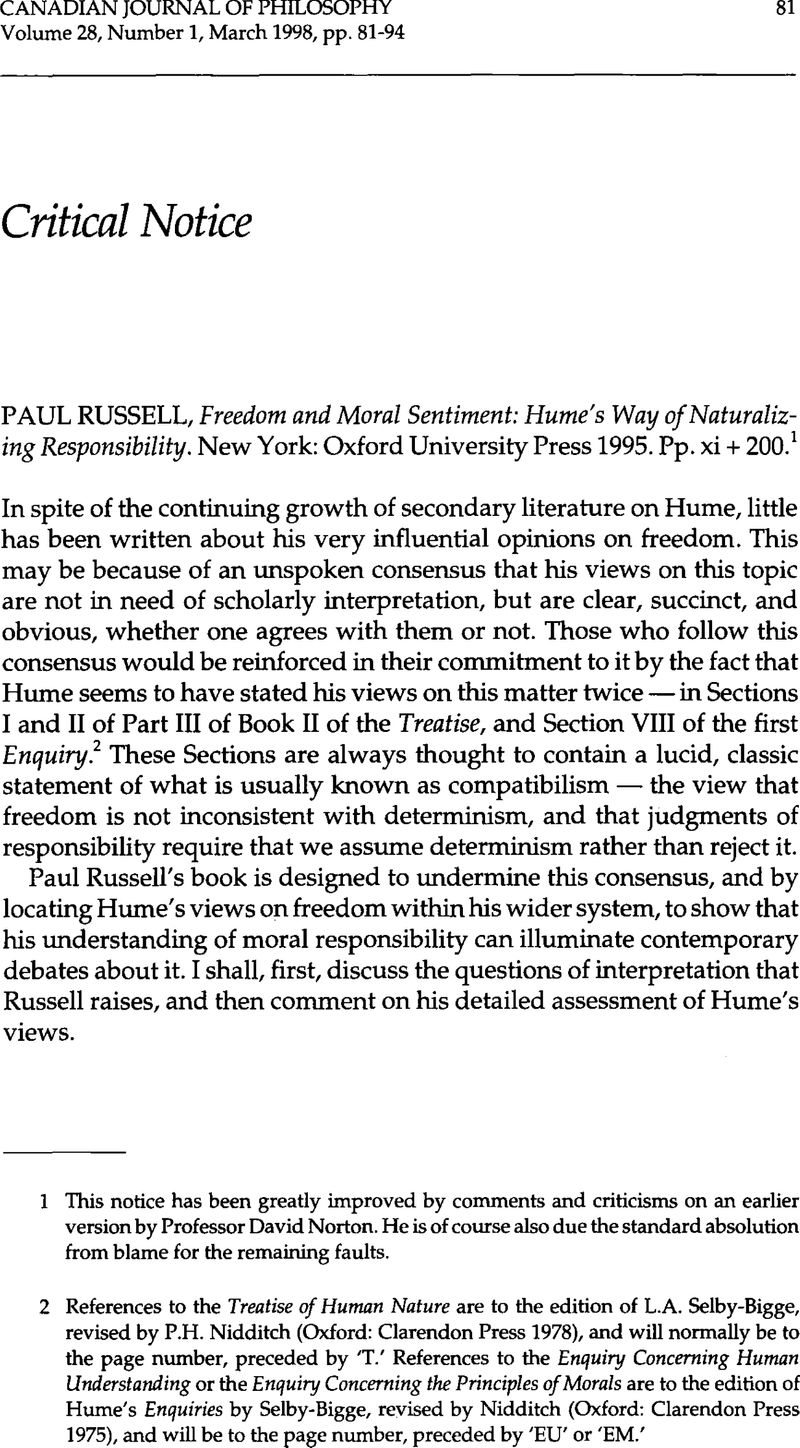Published online by Cambridge University Press: 01 January 2020

1 This notice has been greatly improved by comments and criticisms on an earlier version by Professor David Norton. He is of course also due the standard absolution from blame for the remaining faults.
2 References to the Treatise of Human Nature are to the edition of Selby-Bigge, L.A. revised by Nidditch, P.H. (Oxford: Clarendon Press 1978)Google Scholar, and will normally be to the page number, preceded by ‘T.’ References to the Enquiry Concerning Human Understanding or the Enquiry Concerning the Principles of Morals are to the edition of Hume's Enquiries by Selby-Bigge, revised by Nidditch, (Oxford: Clarendon Press 1975)Google Scholar, and will be to the page number, preceded by ‘EU’ or ‘EM.'
3 See his two essays on ‘The Naturalism of Hume’ in Mind n.s. 54 (1905), and The Philosophy of David Hume (London: Macmillan 1941).
4 See chapter 11.
5 There is a helpful discussion of the scholastic distinction between liberty of spontaneity and liberty of indifference in Kenny's, Anthony Will, Freedom and Power (Oxford: Basil Blackwell 1975) ch. 7Google Scholar.
6 David Norton has drawn my attention to the fact that Hume returns to this claim in Book II (T 311-16 and 360-1), in a way that permits him to accommodate some obvious features of our emotional life. His immediate concern is with the fact that riches, which are ‘the power of acquiring the property of what pleases’ (311) serve to generate pride and admiration - whether their owner spends them or not. He concedes that this indicates that the ‘philosophy of our passions’ does not conform to the principle that the distinction between power and its exercise is a frivolous one. He argues at some length that the ‘error’ we thereby admit into the thinking associated with the passions is not due to any influence from the scholastic doctrine of free will, and is always confined by expectations about the likely exercise of the powers we and others have. I am easy and unafraid when my enemy walks by with his sword at his belt, because I know he has reason to fear the magistrates and thus (so Hume reasons) does not really have the power to attack me. The pride and admiration attached to riches are due to our anticipation of the pleasures they can be used to acquire. The miser's pride in his wealth is due to his self-deceivingly overlooking the factors in his own nature that prevent his putting it to use, and his pride is communicated to the rest of us by sympathy. Hence, ‘power has always a reference to its exercise, either actual or probable’ (313).
7 The first major study is Páll Ardal, S. Passion and Value in Hume's Treatise (Edinburgh: Edinburgh University Press 1966)Google Scholar.
8 Foot, Philippa ‘Free Will as Involving Determinism,’ in Virtues and Vices (Berkeley: University of California Press 1978)Google Scholar, Chapter 4. See also Chapter 5, ‘Hume on Moral Judgment.'
9 It appears at T 399.
10 Hume does try to distinguish between love and ‘esteem,’ very belatedly, in a note to Appendix IV of the second Enquiry (EM 317).
11 Aquinas saw this. See Summa Theologiae Ia 2ae 55, 4, where he incorporates it into the definition of what a virtue is.
12 It is true that Hume’ s account of the origin of the sense of duty leans on the fact that a common motive for action may fail. We disapprove of a father who neglects his children, since we assume a common disposition to care for them. The father himself may internalize this and try to perform the acts that would normally flow from affection, but do so from ‘a certain sense of duty’ (T 479). For discussion of this key aspect of Hume's views on obligation, see Norton's, David essay ‘Hume, human nature, and the foundations of morality’ in The Cambridge Companion to Hume, Norton, David Fate ed. (Cambridge: Cambridge University Press 1993), esp. 168-71CrossRefGoogle Scholar. This is a case of a person recognizing in himself the absence, or weakness, of a motive that is generally expected and praised. My concern here, however, is with cases where a motive has regularly led a particular person to act in the past, but that person surprises us by behaving in a contrary manner.